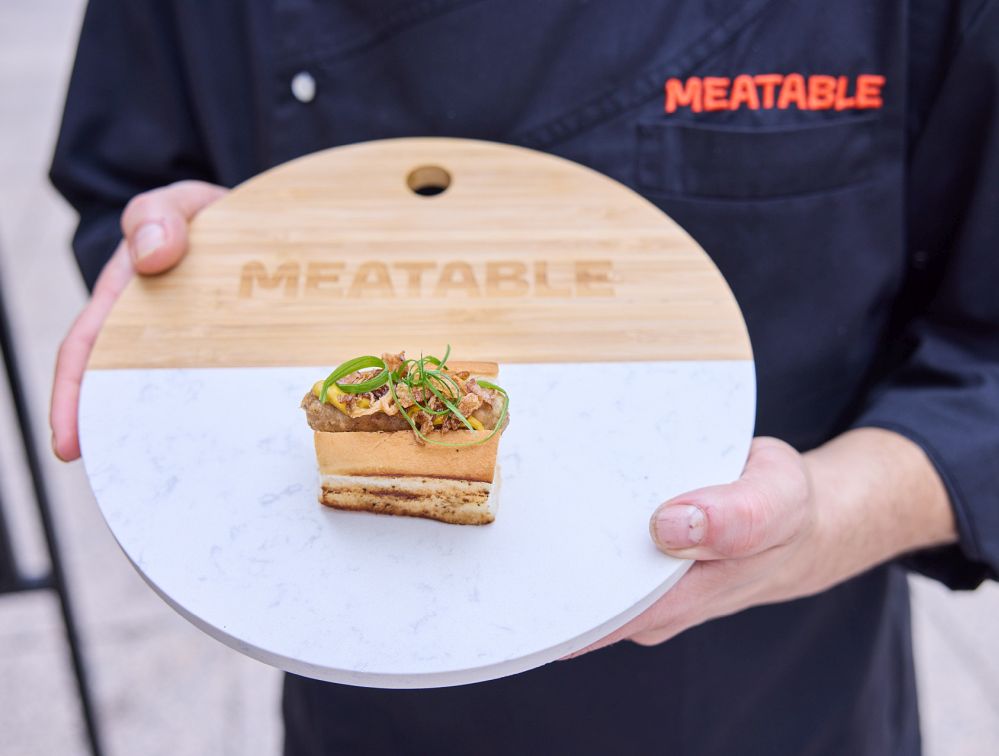Dutch startup Meatable has teamed up with a newly formed company called TruMeat to build a cultivated meat facility in Singapore.
TruMeat is run by executives with significant experience in large-scale biomanufacturing and cell culture media production, and will build a pilot scale plant utilizing Meatable’s technology, with construction to begin later this year, pending new financing, AgFunderNews understands.
According to a press release, which is light on detail, the new facility “will be the first in Singapore to deliver cultivated meat at the cost levels and volumes required to support commercial partners in formulating, testing, and launching products in the market.”
Should this de-risking process and business model prove successful, Meatable is hoping to bring commercial partners from large meat or food companies on board to help fund its first large-scale commercial facilities.
“This is the next step in our journey to make cultivated meat accessible and affordable,” said Meatable CEO Jeff Tripician.
A company spokesperson told AgFunderNews that more information would be shared shortly, but added: “TruMeat is a newly established company in Singapore, but it does draw on the expertise of larger players in the field in Asia. We’re looking to start construction of the facility later this year, at which time we can provide more details on the capacity and size of the bioreactors.”
New models for scaling cultivated meat
Tripician, a US meat industry veteran who took the helm at Meatable last summer, has acknowledged that we’re not going back to 2021 when money was cheap and firms were banking on using VC money to fund large-scale commercial facilities in-house.
Speaking to us in a recent interview, he predicted that, “The companies that will win will have the best science, and they will partner with established [meat] companies to build large-scale plants.”
Meatable, he said, would be “a raw material supplier, as unsexy as that is, a raw material supplier or vendor to a meat company. Meat companies will have this be part of their capex plan for decades, most likely incremental standalone, cultivated meat plants.
“Cultivated meat and seafood can be made to order, it doesn’t have the issues with land, water, disease… avian flu, swine flu, animal welfare, antibiotics,” added Tripician, who has extensive experience in the US meat market in general management, marketing, fundraising and M&A.
“It can address the issues that consumers care about and have already shown they will pay extra for, so if we can do it efficiently, why wouldn’t people buy it?”
Hype, stagnation, consolidation, redirection…
Meatable has slashed production times for cultivated pork over the past two years by dramatically speeding up the process by which its stem cells differentiate into fat and muscle, further improving its unit economics at a time when the industry is facing intense scrutiny.
Speaking to us last year, cofounder Daan Luining acknowledged it was a challenging time for the cultivated meat industry but noted that Meatable had secured the largest round ($35m series B) in the sector in 2023, taking its total funding to just under $100 million.
“I think what we’re seeing is a natural cycle for all innovation, where you see hype, then stagnation, then consolidation, and then redirection,” said Luining, a biologist who cofounded Meatable in 2018 with stem cell biologist Dr. Mark Kotter and McKinsey exec Krijn de Nood. “But the companies with something unique and of value will stay because they have something worth investing in.”
Rather than “re-programming” or inducing adult cells to get them to behave like embryonic stem cells (which can differentiate into any cell type), Meatable is extracting pluripotent stem cells from animals’ umbilical cords. These cells have certain advantages including rapid division and versatility (they can differentiate or transform into multiple different cell types such as fat or muscle), said Luining, who is growing them in a continuous perfusion process.
However, Meatable’s secret sauce is its ability to understand the internal machinery within the cells that triggers them to develop into different cell types by deploying patented Opti-Ox technology developed by cofounder Dr. Mark Kotter. This activates transcription factors (combinations of which encode the identity of cells) with a precision “rarely seen in biology,” enabling Meatable to both precisely control and dramatically speed up the differentiation process, said Luining.
“We’re using cells’ natural ability to turn into muscle or fat by pressing the buttons that turn them into muscle or fat. This is really a breakthrough in stem cell biology. We went from 45 days to 21, then eight, and now four days [to differentiate pluripotent stem cells into muscle and fat cells]. Doing it this fast is ultimately what makes our cultivated meat production process economically viable.”
While Meatable is not deploying a tissue engineering approach for its first products, the cells it harvests are fully differentiated, which is important from a nutritional perspective, claimed Luining. “Don’t get me wrong; we’re not making a steak, but we are making high quality fat and muscle.”





